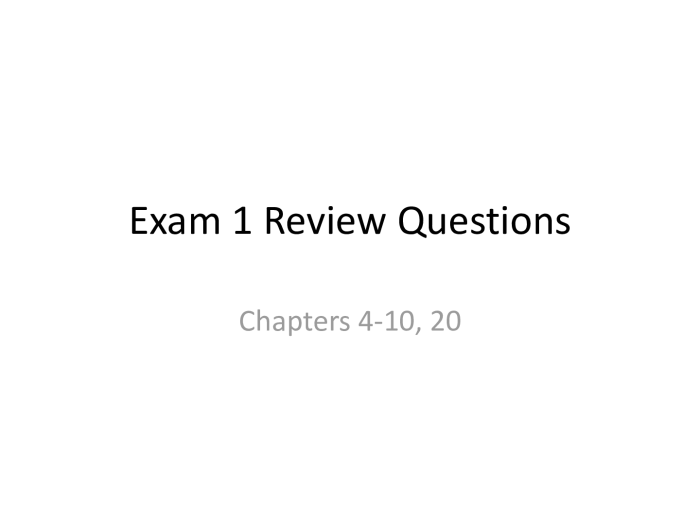Nr 283 exam 1 chamberlain – Embark on a journey of academic excellence with NR 283 Exam 1 at Chamberlain! This comprehensive guide will empower you with the knowledge, strategies, and resources to conquer this exam with confidence.
Delve into the intricate details of the exam, including its structure, key concepts, and study materials. Learn effective exam preparation techniques and time-tested test-taking strategies to maximize your performance.
Course Overview
The NR 283 Exam 1 at Chamberlain is designed to assess your understanding of the fundamental concepts covered in the first half of the course.
The exam covers a wide range of topics, including the nursing process, health assessment, pharmacology, and nutrition. It is important to be familiar with all of these topics in order to do well on the exam.
Format and Structure
The exam consists of 50 multiple-choice questions. You will have 90 minutes to complete the exam.
Key Concepts

The NR 283 Exam 1 encompasses various key concepts and theories that form the foundation of nursing practice. Understanding these concepts is crucial for success in the exam and beyond, as they provide a framework for comprehending and addressing patient care situations.
These concepts are interconnected and interdependent, forming a comprehensive understanding of the nursing profession. They provide nurses with the knowledge and skills necessary to deliver safe, effective, and compassionate care to their patients.
Holistic Care
Holistic care recognizes the patient as a whole person, considering their physical, emotional, social, and spiritual well-being. It emphasizes the importance of understanding the patient’s unique needs and preferences, and tailoring care accordingly. By adopting a holistic approach, nurses can provide comprehensive and individualized care that promotes optimal patient outcomes.
Patient-Centered Care
Patient-centered care places the patient at the heart of the care process. It involves actively involving the patient in decision-making, respecting their values and preferences, and tailoring care to their specific needs. By empowering patients and fostering a collaborative relationship, nurses can enhance patient satisfaction, improve outcomes, and promote self-management.
Evidence-Based Practice
Evidence-based practice (EBP) is a systematic approach to nursing care that integrates the best available research evidence with clinical expertise and patient preferences. By utilizing EBP, nurses can make informed decisions about patient care, ensuring that interventions are safe, effective, and supported by scientific evidence.
This approach enhances the quality of care and promotes positive patient outcomes.
Interprofessional Collaboration
Interprofessional collaboration involves working effectively with other healthcare professionals, such as physicians, pharmacists, social workers, and physical therapists. By fostering a collaborative environment, nurses can share knowledge, expertise, and perspectives, resulting in more comprehensive and coordinated patient care. Effective interprofessional collaboration enhances patient safety, improves communication, and promotes a team-based approach to healthcare.
Nursing Informatics, Nr 283 exam 1 chamberlain
Nursing informatics utilizes technology to improve the delivery of nursing care. It encompasses the use of electronic health records, decision support systems, and other technological tools to enhance patient safety, efficiency, and communication. By embracing nursing informatics, nurses can streamline documentation, access real-time patient data, and facilitate interprofessional collaboration, ultimately leading to improved patient outcomes.
Exam Preparation Strategies

Preparing for exams can be stressful, but with the right strategies, you can improve your chances of success. Here are some effective exam preparation techniques:
Active Recall
Instead of passively rereading your notes, actively recall the information by testing yourself. Use flashcards, practice questions, or explain concepts to someone else. This forces your brain to work harder and improves retention.
Spaced Repetition
Reviewing material at increasing intervals helps strengthen memories. Start by reviewing shortly after learning, then gradually increase the time between reviews. This helps prevent forgetting and consolidates information in your long-term memory.
Mock Exams
Take practice exams under timed conditions to simulate the actual exam experience. This helps identify areas where you need more preparation and gives you a sense of confidence.
Managing Stress and Anxiety
Exam preparation can be stressful, but it’s important to manage your stress and anxiety. Engage in relaxation techniques like deep breathing, meditation, or exercise. Seek support from friends, family, or a therapist if needed.
Rest, Nutrition, and Exercise
Getting adequate rest, eating a healthy diet, and exercising regularly are crucial for exam preparation. Sleep deprivation, poor nutrition, and lack of exercise can impair cognitive function and make it harder to focus.
Test-Taking Techniques: Nr 283 Exam 1 Chamberlain
Approaching different exam question types requires specific strategies. Multiple-choice questions demand careful analysis of all options and selecting the best fit. True/false questions require a clear understanding of concepts and the ability to identify correct statements. Short answer questions test your ability to concisely and accurately articulate your knowledge.
NR 283 Exam 1 Chamberlain, you say? Don’t sweat it! Check out this helpful resource on the French and Indian War DBQ: french and indian war dbq . It’s got everything you need to ace that exam, from historical context to analysis tips.
And when you’re done, come back here for more NR 283 Exam 1 Chamberlain prep.
Time management is crucial during the exam. Allocate time wisely for each question, ensuring you complete all sections within the given timeframe. Avoid spending excessive time on any single question; move on and return to it later if necessary.
Read questions thoroughly before attempting to answer them. Identify key terms and concepts, and ensure you understand what the question is asking. Avoid making assumptions or rushing through questions.
Common Pitfalls
Common pitfalls in exam-taking include:
- Misreading or misunderstanding questions.
- Answering questions based on assumptions rather than the provided information.
- Not using the allocated time effectively.
- Failing to review answers before submitting the exam.
Exam Review
Preparing for Exam 1 in NR 283 requires a comprehensive review of the key concepts covered in the course. To facilitate your preparation, we recommend creating a review guide that summarizes these concepts and provides practice questions.
Your review guide should be well-organized, using headings, subheadings, and bullet points for clarity. Consider including a section with frequently asked questions and their answers to address common areas of confusion.
Creating a Review Guide
- Identify the key concepts covered in the course materials, including lectures, readings, and assignments.
- Organize the concepts into logical categories or topics.
- Summarize each concept concisely, highlighting the most important points.
- Include practice questions or exercises to test your understanding of the concepts.
- Review the guide regularly to reinforce your learning and identify areas where you need additional support.
Frequently Asked Questions
- What are the most important topics to focus on for the exam?
- What types of questions can I expect on the exam?
- How can I effectively prepare for the exam?
- What resources are available to help me succeed in the course?
- Where can I find additional practice questions or study materials?
Helpful Answers
What is the format of NR 283 Exam 1?
The exam typically consists of multiple-choice, true/false, and short answer questions.
How should I prepare for the exam?
Utilize recommended study materials, create a personalized study plan, and employ active recall and spaced repetition techniques.
What are some effective test-taking strategies?
Read questions carefully, manage your time wisely, and avoid common pitfalls such as rushing or second-guessing your answers.